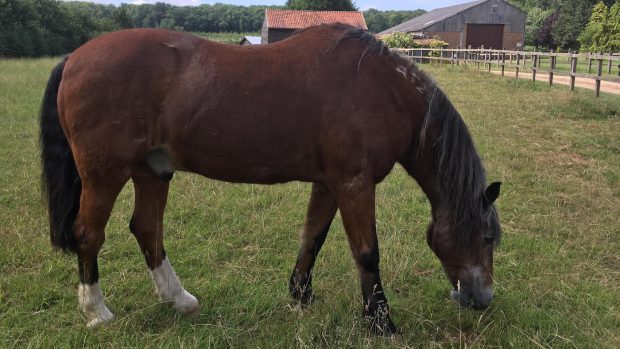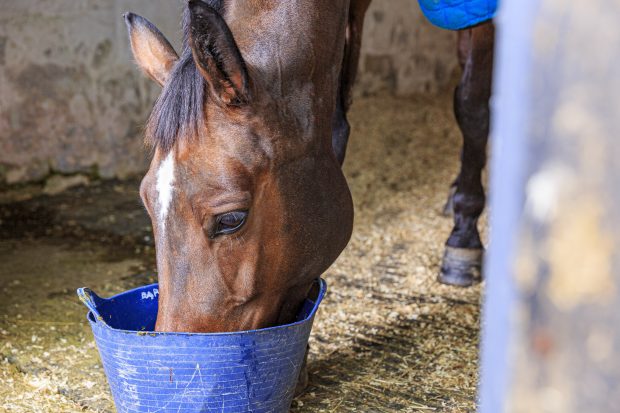Feeding is a complicated science — never more so than with a competition horse aiming for peak performance. Emily Bevan sorts the facts from the fiction
Myth: adding oats to my horse’s feed ahead of a competition will give him an energy boost.
One of the golden rules of feeding is to be consistent, so making any sudden changes to your horse’s diet, particularly ahead of a competition when you are wanting him to perform at his best, is never a good idea.
“An abrupt dietary change can increase the risk of colic, plus during exercise horses, like humans, use stored energy sources not energy directly from their previous meal,” says Yvonne Judith, an equine nutritionist with a focus on competition horses. “This ‘instant’ energy may also cause behavioural issues in some horses — the last thing you want before a competition.”
For a horse to safely receive the full energy benefits that oats provide, he would need to be consuming them daily, rather than just on or before competition day.
“Oats are a great way of adding quick-release energy into the diet for horses who can be lethargic or lacking in energy, but this should not be seen as a substitute for ensuring adequate fitness,” says Katie Grimwood, a nutrition advisor from Baileys Horse Feeds.
Myth: my horse shouldn’t drink after competing as he will get colic.
While all riders and owners are aware of the importance of hydration, many withhold water after exercise as they believe it’s not safe for a horse to drink if he’s hot and sweaty.
However, this isn’t true and a horse’s thirst instinct is at its highest after exercise so it’s important to make the most of this opportunity to rehydrate your horse as soon as he wants to drink.
“Exercise has a direct effect on thermoregulation and fluid balance,” explains Emma Nissler, Dodson & Horrell’s nutritional manager. “The water requirements of competitive horses are affected by several variables that can influence sweat and respiratory fluid losses. Water has a direct and indirect involvement in nearly every physiologic process within the body, and so it is really important to ensure they are rehydrated, especially post-exercise when their natural instinct is at its peak.”
Myth: I should avoid including molasses in my horse’s diet as it will make him excitable on competition day
Molasses is a byproduct of sugar cane or beet so naturally has a high sugar content. While sugar is fine in moderation, many riders and owners believe the high sugar levels in molasses will give their horse too much energy on competition day. However, what they don’t realise is that molasses is already included in most competition mixes in a diluted state to bind the ingredients and dampen the mixture to reduce dust.
“Molasses gets blamed for a myriad of problems, including hyperactivity,” says Saracen Horse Feeds’ senior nutritionist Lizzie Drury. “Molasses supplies the horse with digestible energy because it is composed entirely of sucrose, glucose and fructose. The amount of molasses in a typical helping of a concentrate feed cannot, however, induce hyperactivity.”
It’s important to look at the sugar content in your horse’s diet as a whole rather than singling out specific ingredients.
TopSpec’s nutrition director Nicola Tyler adds: “Molasses contains approximately 50% sugar and its contribution to the total level of sugar in the diet should be calculated before ruling it out.”
Myth: I don’t need to give my competition horse much forage as he gets all the calories and energy he needs from his hard feed
Horses are trickle feeders and need to have regular access to forage to keep their gut mobile. Forage also contains all the essential nutrients a horse requires and should form the basis of every horse’s diet. One of the main components of forage is fibre.
“Fibre supports the way that the horse has evolved to graze and provides a bulk to the feed to maintain and support digestive health,” says Katie Grimwood. “It can also allow the horse to better utilise the nutrients received through the concentrate feed.”
There is a common belief that forage shouldn’t be fed to a horse while travelling or before competition as it gives them colic or slows them down.
“The opposite is actually true,” says Yvonne Judith. “A lack of fibre can increase the risk of gastric ulcers and colic. Fibre does bind water in the gut but the slight increase in weight will not impact performance.”
Myth: if I feed a specific product it will help my horse’s physical development
It’s important to take advice from a nutritionist to ensure you are feeding a balanced diet and are not wasting money on fad products or supplements.
“There is a belief among lower level competitors that feeding a certain product or supplement can help your horse to gain topline without supporting the diet with a structured exercise plan. As a result, owners can be tempted to load the horse up on excess ingredients that he doesn’t actually need,” says Blue Chip Feed’s Emma Nicholls.
Protein is one of the key supplements owners often include, believing it helps condition muscle.
“While protein is required to build muscle tone and topline and is needed for the growth and repair of body tissues, feeding protein alone is not sufficient to promote topline and should be used in combination with correct training,” explains Katie Grimwood.
If your horse is consuming a balanced diet he should be receiving the nutritional support he needs for all areas of development.
“Topline develops from the correct working of the horses’ muscles along the spine to build a ‘top line’. Quality amino acids are required to help build muscle and feeding the correct diet according to the horses’ requirements should provide these amino acids, without the need for additional supplements,” says Anne Priestman.
Myth: we are moving up a level in competition so I’ll increase my horse’s food intake to ensure he has enough energy to cope
“Grassroots competitors are often naïve in what they are feeding their horses and think that when they step up a level they need to increase their horse’s feed intake,” says Emma Nicholls. “The overriding message is ‘my horse needs more energy so I will up his feed’ rather than looking at the type of feed he requires.”
Understanding your horse’s dietary requirements is essential if he is to perform to his best and maintain a healthy weight. Advice from a nutritionist can not only help to ensure your horse consumes the correct feed, but also that he receives the appropriate quantities.
“Another common misconception is that feeding ‘high energy’ feeds can help to improve energy levels without causing weight gain,” explains Katie Grimwood.
“Calories are just units of energy, so high energy feeds are also high in calories. Although feeds such as competition mixes or straight oats can work to an extent, if used they should be incorporated as part of a fully balanced diet and in combination with a suitable fitness regime.”
Myth: my horse performed well today in tough conditions. I’ll give him a bran mash when we get home as it’ll be good for him
While a bran mash may be considered a warm, comforting treat and it can help increase your horse’s water intake, if it is not a regular component of his diet it has no place in his feed bucket.
“Recovery is such an important part of any horse’s routine, especially competition horses that are in harder work,” explains Emma Nissler, Dodson & Horrell’s nutritional manager. “While ‘recovery’ feeds are tempting to add into their meals on a competition day, it is more likely to be effective as part of their regular concentrate ration.
“For horses in hard work, that sweat heavily during exercise and travel, the addition of electrolyte salts (sodium, chloride, potassium, magnesium and calcium) will ensure the nutrients lost through sweat are replenished efficiently and will positively influence recovery time. Performance feeds will sometimes contain added electrolytes already, but if not, electrolytes can be added to their meals a day before, the day of, and up to two days post-competition.”
“Abrupt dietary changes are never a good idea and bran is no exception. Bran is not balanced, especially in terms of calcium and phosphorus, and can actually be quite abrasive on the digestive system,” says Yvonne Judith. “Also be warned: some products marketed as mashes, especially within Europe, can be very high in starch which could contribute to colic, tying up or behavioural problems.”

The 10 golden rules of feeding horses

Subscribe to Horse & Hound this spring for great savings
Horse & Hound magazine, out every Thursday, is packed with all the latest news and reports, as well as interviews, specials, nostalgia, vet and training advice. Find how you can enjoy the magazine delivered to your door every week, plus options to upgrade your subscription to access our online service that brings you breaking news and reports as well as other benefits.





